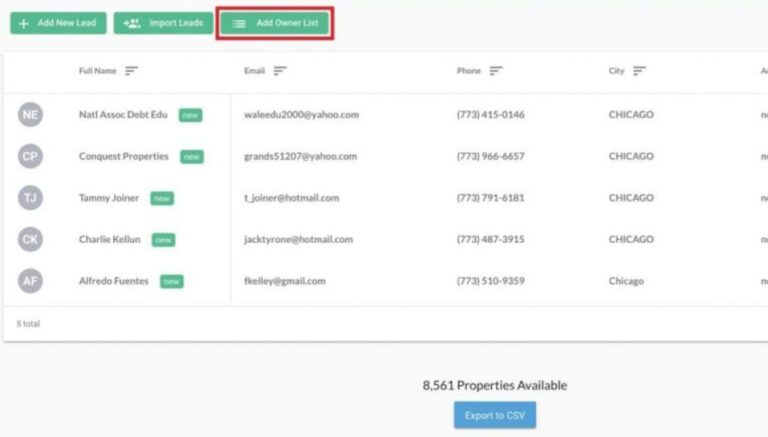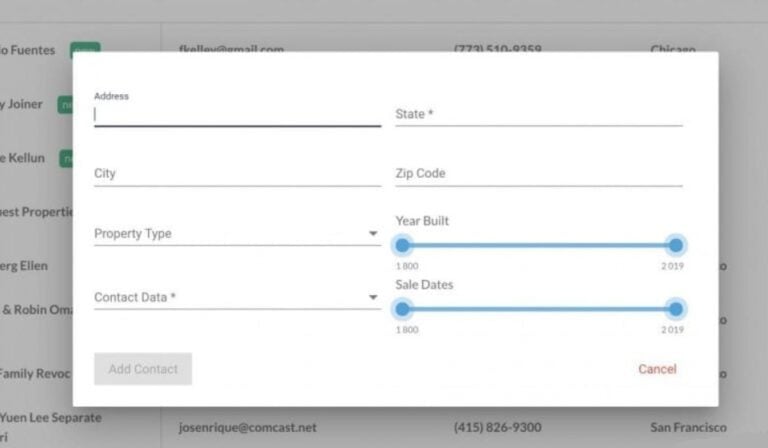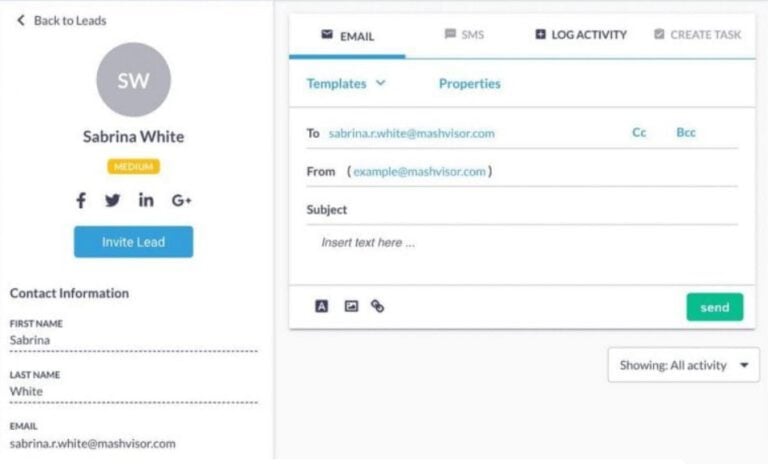Are you wondering how to find out who owns a house? We will cover several methods to figure out who owns a house, lot, or piece of property.
So, have you ever wondered who owns that dilapidated Victorian home two blocks away from your house? Have you ever thought of acquiring it for a small price? Well, you’re not the only one. It’s not uncommon to want to know who owns a house or a property, especially for a real estate investor looking to land the best real estate deals.
Table of Contents
- How to Look up Who Owns a House: Most Common Ways
- Why Investors Might Want to See Who Owns a Particular House
Because of the fierce competition in today’s market, many investors go about looking for off-market real estate opportunities. They perform a property owner search in a well-performing housing market and create a list of all the potential sellers they find.
Once they find out who the owner of a property is, they get in touch with them to let them know they are interested in buying investment property in the neighborhood. If the homeowner is motivated to sell their own house, the real estate investor will then make an offer and finalize the deal.
Related: How to Choose the Best Location for Investment Property
How to Find Out Who Owns a Property: Most Common Ways
But you might still be wondering: How to see who owns a house, and can you look up who owns a house? Actually, there are several ways. Here are the two most common ways on how to find out who owns a property by address in 2023.
1. Property Tax Records
The first way is to look up local property tax records to find property owner information. Usually, each town or county has a tax assessment website. It allows anyone to do title searches for tax records and property information online (title company) as long as you have the address of the property.
But in many cases, you may have to visit the tax assessor’s office in person and search through paper records manually if no website exists for the county where the property is. This also requires you to have the address of the property.
2. Public/Local Library
Your local library may provide free computer access to public records (databases). Furthermore, the staff is prepared to direct customers to reference resources pertaining to property transactions and ownership. Suppose the house or structure in issue sold long ago. In that case, your local librarians could locate tangible records and contact information that are more difficult to find.
3. Property Deeds
Another way to find out who owns a house is through a property deed search using the Registry of Deeds. Searching the Registry of Deeds is, in principle, similar to the process of looking up tax records to find a property owner. If the county where the property is situated has a Registry of Deeds website, you’ll need to enter the property’s address and select the most recent deed on file.
The latest deed will tell you who owns this property currently. Here also, you may have to take a trip to the county’s recorder’s office and search for the deed to the property in person if the county does not have an online service.
Searching through public property owner records, whether tax records or property deeds, might seem like an excellent way to find the owner of a property. But how to find out who owns a property without an address?
Successful real estate investors typically don’t go around their neighborhoods writing down addresses in order to find investment properties and perform a property owner search. Many don’t even invest in their local housing markets and still manage to find out who owns a property.
4. Private Resources for Locating the Owner of a Property
If the public resources and city hall fail you or you reach a brick wall for any reason, you may want to go private and hire an expert to collect the information.
- Visit a title search company: These are the independent businesses that do title searches during real estate transactions to guarantee that there is no old complaint against the property title, such as mortgage obligations or liens. Despite these companies’ fees, you’ll probably get an answer.
- Consult a real estate attorney: Finding the owner of a property owned by an LLC or part of a probate dispute can be difficult. A real estate attorney may be able to find out why you’re hitting a roadblock and get to the base of ownership in circumstances when you cannot figure out who has the title.
Nevertheless, such options can be quite pricey. But if you’re in a hurry, it may be worth a try.
Regardless of such expensive options, there is always a budget-friendly one that also saves you time. So let’s see how to find out who owns a house like the pros do. We’ll do so in a few easy steps that guarantee success in how to find the owner of a property journey.
6 Steps to Find Out The Owner a Property
Step 1: Sign Up for Mashvisor
So, how to find the owner of a house in 2023? To find out who owns a property, you need to equip yourself with an advanced tool that enables you to easily search for property owners in any location in the US real estate market, even if you don’t have any information on the property or the owner. The best tool to help you perform a quick online property owner search is Mashboard.
Use Advanced Tools: Mashboard
Mashboard is primarily a digital marketplace and leads/property management hub. The Mashboard property management app is peculiar in that it includes the three parties required for each real estate transaction: buyers, agents, and sellers.
With Mashboard, it’s actually relatively easy to find the owner of any off-market property, with or without an address. In just a few simple steps, you can forgo the need to sift through local records to unearth property owner information. You can even build a property owner list to have a reliable source of off-market real estate deals to turn to at any time.
- Search through thousands of foreclosure, auctioned, and off-market properties to locate the best investment opportunity.
- To ensure a lucrative investment, get a detailed yet quick examination of any property.
- Easily advertise an investment property for thousands of potential buyers looking for off-market options.
To access Mashboard, you need to sign up for Mashvisor. By signing up for the platform, you will also gain access to other investment tools that are useful for real estate investing, including:
- Property Finder
- Heatmap Analysis Tool
- Data API (Investment Property Calculator)
Below, we will cover the five steps on how to find out who bought a house or who owns it using Mashboard.
Mashvisor provides state of the art real estate investment tools to help you make wise investment decisions and walk you through your investment journey. Please sign up here to start analysing the investment opportunities in both short trem and long term rental industry.
Step 2: Access Mashboard and Click “Add Owner List”
To start your online property owner search, access Mashboard through the Mashvisor platform and click the Add Owner List button, as shown in the picture below.

Mashvisor’s Mashboard allows users to find out who owns a house by adding a list of owners to your property search.
Step 3: Set the Filters
The next step is to set the filters for your property owner search. You will notice that several filters are available. Which ones you’ll need to select will depend on whether you know the address of your subject property.

You can customize your property owner search by setting and adjusting filters.
Find Property Owner by Address
If you know the property data (address) of your subject investment property, then go ahead and type it in the Address field. Once you enter the property’s address, you will notice that all the other location-related filters (‘State,’ ‘City,’ and ‘Zip Code’) will fill automatically.
Related: How to Find Rental Rates by Zip Code
How to Find Property Owners Without an Address
If you do not have an address, you need to input any information that you have on the property or the area where you’d like to find off-market properties. It means you will have to fill in the following filters:
- State
- City
- Zip Code
- Address (here, you can type in the name of the neighborhood)
Besides the location-related filters, there are some other filters that you can set to narrow down your property owner search. These include:
- Property Type: This filter allows you to choose the type of real estate that you’re looking for. You can select one of the following property types: single-family home, multifamily home, townhouse, apartment, duplex, condo/coop, and more.
- Year Built: You might be looking for an early 19th-century house in a historic district, or on the contrary, for a brand new and modern home. You can, therefore, use this filter to specify a date range and find an investment property built within that range.
- Sale Dates: As a real estate investor, you should always take into account the sales date of the property you’re eyeing. A homeowner who recently purchased a property is less likely to be willing to sell. Using this filter, you can, therefore, identify all the investment properties that sold recently. It will maximize your chances of finding owners that are willing to sell.
- Contact Data: This final filter allows you to choose which contact details you would like to receive about the property owner, such as their address, email, and phone number.
Once you finish setting all the above filters, click the Add Contact button, and the system will then gather the data for you.
Step 4: Download the CSV Report
Once the data is gathered, Mashboard will display a list of property owners based on your filter selections, along with their contact data, including:
- Owner’s Name
- Owner’s Address
- Owner’s Email
- Owner’s Phone Number
It will depend on which type of contact details you’ve chosen to receive.
You can then download the property ownership information in the form of a CSV report. Or, you can simply check out the ownership data on Mashboard.
Step 5: Connect With the Property Owners
Now that you have all the property owner information you need, you can finally get in touch with the owners of the properties you are interested in and start negotiations. Mashboard allows you to contact the owners directly. You can actually send emails, email campaigns, as well as SMSs, all through the platform.
Keep in mind, however, that not every homeowner you talk to wants to sell their property to you right away. That’s why you need to make sure to adopt a solid real estate marketing strategy and combine it with effective negotiation tactics to reach a deal.

Once you have the information you need, you may now reach out to the property owner.
Step 6: Repeat
Since you have access to an extensive property ownership database, you can repeat the whole process to create a new owners list, find motivated sellers, and close new deals. That way, you will see your investment portfolio grow in no time.
Why Investors Might Want to Find Owner of Property?
It may appear that you need to know who owns a home for obvious reasons, but some may surprise you. Here are the three main benefits of knowing who actually owns a particular house.
1. Understanding Who You’re Dealing With
People occasionally try to sell you a property they do not truly own. Perhaps the property was passed on, and one of the beneficiaries wishes to sell while the other does not. So, the person who wants to sell may accept your offer in order to force the issue. Then you’re stuck in a legal situation that might endure a long time. Prior to getting involved, you should get to know everybody on the title.
2. Clear Titles Are Not Always Sold at Auction
Assume you are purchasing your property at a sheriff’s sale. Because it is a foreclosed property, you believe you must make the purchase. However, this is not the case. You are liable for any liens, debts, and unpaid real estate taxes in many sheriff sales. It is possible to discover what is due, but you must first determine who the owner is.
3. Not Every Home Is or Will Be for Sale
If you’ve been in the industry long enough, you can spot residences about to go on the market. You can accomplish this by researching liens, delinquent taxes, assessor claims, and other information.
If you know the owner, you may contact them to present an offer. They may be searching for a break if they are in financial difficulty. Make the first move and present it to them. That might help with the selling.
As we can see, discovering who owns a property or piece of land is typically straightforward and has various advantages. It assists you with ensuring that you are only doing business with the genuine, legal owner of the asset.
In a heated market, every early edge helps. You may also be able to contact directly with a possible seller whose house is not listed but who is open to bids.
Related: How to Find Affordable Investment Properties With Huge Potential
Conclusion on How to Find Out Who Owns a Property
Let’s sum up the best ways on how to find out who owns a house. Finding out who owns a property is typically straightforward and has several advantages (as we mentioned above). Often, a search will reveal not only who owns the house but also any current liens or prior obligations. The identity of the current owner and the current property taxes are available from public sources.
In that way, you may also view when property transfers occurred, as well as the history of ownership.
Once you know the owner’s name, you could be able to look for the current mortgage holder in a grantee/grantor register. You won’t be able to find out how much an owner owes on their mortgage or what their payments seem like, but you will be able to confirm that a loan exists and who the lender is.
When looking for homes, be wary of misleading information and companies that utilize illegal strategies. Try not to be too invasive, and if you have any questions, contact the county.
In the end, determining property ownership is essential for real estate investors who are looking to buy income properties that are not on the market and expand their real estate investment portfolio. The best way to find out who owns a house is by using Mashboard. With Mashboard, you can search for property owners anywhere in the US with a click of a button.
Mashvisor provides state of the art real estate investment tools to help you make wise investment decisions and walk you through your investment journey. Please sign up here to start analysing the investment opportunities in both short trem and long term rental industry.